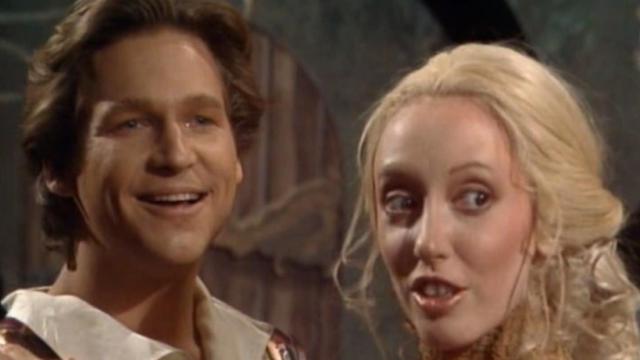There comes a moment in every fairytale lover’s life when you realise that many of the stories you grew up learning in children’s books—and perhaps a little later in children’s movies—were infused with a fair amount of garden variety sexism and small-mindedness packaged as fantastical parables. Shelley Duvall’s Faerie Tale Theatre took those stories and troubled concepts and went absolutely wild with them.
Faerie Tale Theatre was precisely the kind of show that inspired these moments of clarity, not because of any one type of withering criticism, but because of the way the series’ creative team loved the concept of fairy tales enough to poke fun at them with wit and insight that we should all approach these types of stories with. Initially conceived by the Shelley Duvall while she was filming on the set of Popeye (her co-star, Robin Williams, would go on to start in “The Frog Prince” episode), Faerie Tale Theatre was a series that retold a number of classic fairy tales like Rapunzel, Sleeping Beauty, and Pinnochio. The 27-episode anthology series aired on Showtime from 1982-1987.
[referenced url=” thumb=” title=” excerpt=”]
More like Fractured Fairy Tales than most anything Disney ever released into theatres, Faerie Tale Theatre presented each of its stories with a knowing wink and nod signalling that there were more than a few levels of jokes to be in on, many of which functioned as clever bits of scathing social commentary. The series also featured a slew of famous faces through its stories including Leonard Nimoy, Anjelica Huston, Jeff Goldblum, Carrie Fisher, James Earl Jones, Susan Sarandon, René Auberjonois, Alfre Woodard, Christopher Lee, Liza Minnelli, and Malcolm McDowell, just to name a few.
In “Rumpelstiltskin,” when the young Miller’s daughter (Duvall) realises that her father (Paul Dooley) has promised the king (Ned Beatty) her hand in marriage after also lying to the monarch about her supposed ability to spin hay into golden thread, she understands that she’s essentially been sold off as if she were an object rather than a person with agency. By letting the cast of each of its episodes lean into their respective comedic strengths, Faerie Tale Theatre was able to highlight the absurdity woven into each of the fables it explored and emphasise the aspects of characters’ actions that we should all see as deeply messed up. To be exceedingly clear, however, the series wasn’t always on the level. Case in point: Mick Jagger shows up in full yellowface in season two as the Emperor in “The Nightingale.”
Much of Fairie Tale Theatre’s magic stemmed from the way the series was careful to both never take itself too seriously while also not shying away from a very intentional feminist ethos. Christopher Reeve’s Prince Charming in “Sleeping Beauty” is a himbo in the truest sense of the word, but his presence in the fairy tale served almost as if to say to the audience, “Look at this gorgeous, ineffective man. Now reconcile how he’s being presented here with your ideas of him as an iconic Superman.”
The point of it all was to make you laugh, but also to make you think about what you were laughing at, why it delighted you, and just why exactly any of the series’ put-upon princesses, queens, and frosty witches would ever deign to deal with any of these emotionally draining men. Campy as the show was, each episode had a way of making the magical worlds on display feel relatively grounded in reality—stripping just enough of the dreamy romanticism off the surface to make obvious just how much the original stories’ morals and ideas (both good and bad) are things that have become pop culture mainstays.
When a group of fairies questions a king as to why bravery isn’t a suitable gift to be given to a newborn princess, it isn’t wrapped up in the fancifulness of a fully-produced musical number packed with singing, dancing animals. Instead, the question’s presented plainly along with the observation that in a land potentially filled with dragons and other dangerous magical creatures, bravery’s precisely the sort of personality trait any person would be lucky to have, and to act as if that’s not plainly obvious is patently mad.
Even if Faerie Tale Theatre’s unabashedly feminist politics aren’t necessarily your thing, the series is worth giving a re-watch now, if only because it’s just straight-up funny in a way that most stories meant to challenge your perceptions of the world tend to be. Its messages are just as relevant today as they were back in the ‘80s when the series first aired, and if you’re in need of some fantasy to escape our current reality, it’s definitely something worth checking out.
[referenced url=” thumb=” title=” excerpt=”]
Editor’s Note: This article has the US release date. We will update this article as soon as possible with an Australian release date, if available.
